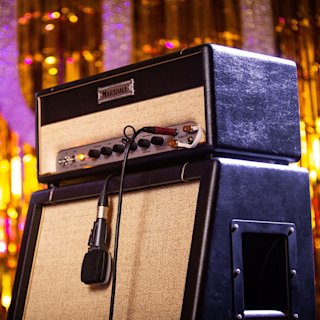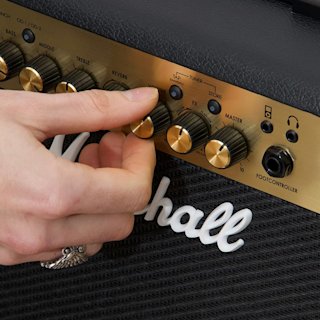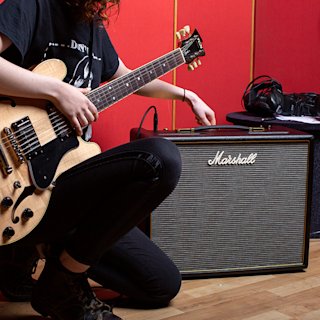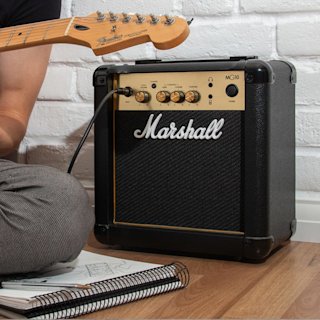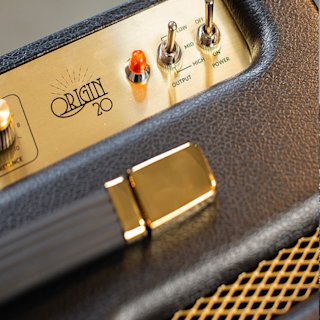How to Get Gigging

The time has come to take your place under the spotlight, most likely in a local independent venue. For every musician, there comes a moment when you're ready to step out of the rehearsal room and onto the stage.
Whether you’re organising a gig for a venue with a 50 or 200-person capacity, it doesn't have to be as overwhelming as it first seems. We've broken it down into simple steps to help you get the most out of your first shows, especially in smaller venues where space, sound and setup can be tight.
STEP 1: THE BOOKING
Trying to book your first gig can be a daunting task, but looking online is a good place to start, whether that’s finding the venue’s email or popping in to introduce yourself face-to-face. Smaller venues, such as pubs and local community spaces, are usually the most welcoming for new acts. They offer intimate crowds, simple setups and a great opportunity to build real connections.
Many bands and venues post available support slots on social media, and following your local music scene helps you get familiar with which venues and promoters are active. Start making connections with artists in your area and learn what kind of shows are happening nearby.
As you start to book shows, you'll come across two key players:
Promoters:
Responsible for organising and hosting a gig
May work freelance or be based in-house at the venue
Handle bookings, secure the venue, and promote the event
Agents:
Employed by artists to book shows on their behalf
Usually come into play after you've gained some experience playing live shows
Help secure more prominent or better-paying shows
Remember, when approaching promoters or venue owners for gigs, it's crucial that you present yourself in the best possible light. Having a demo at the ready and knowing your social media statistics can help establish credibility. It's also important to be realistic when you'renegotiating a deal.
Making outrageous backstage demands or asking for an unreasonable amount of money may give people the wrong impression of you. After all, it's the experience and the chance to make great contacts that will benefit you the most. However, it’s important to be clear about ticket sale splits from the start and to watch out for any requests that ask you to pay to perform, which is a common industry scam known as 'pay to play'.
Also, make sure you ask the right questions early:
What gear will be provided on the night?
Will there be backline?
Do you need to bring your own amp, cab, or pedalboard?
Smaller venues often have limited gear and stage space, so understanding the setup ahead of time ensures a smooth setup with no surprises.
STEP 2: THE PREPARATION
The time spent gearing up for a show can be just as important as the gig itself; it's an opportunity to refine your sound and performance. In smaller venues, factors such as volume, clarity and stage movement matter even more.
However, good preparation isn't just about rehearsing. It's also about promotion. Even if you've booked the gig through a promoter, there's a lot to gain from doing your own advertising:
Create a Facebook or Instagram event
Share rehearsal clips, graphics, or live snippets
Post regularly to build interest
A small venue only needs a handful of dedicated fans to feel packed.
Don't be afraid to ask questions ahead of the big day; it's helpful to know:
The full line-up and running order
The venue's merch policy and table space
Load-in times, soundcheck times, and set lengths
STEP 3: THE BIG DAY
At small venue gigs, there's not always a lot of room or time, so being prepared helps everything run smoother.
Make sure to:
Check and pack your gear ahead of time
Bring spares - strings, cables, batteries, picks
Use compact gear - small stages can be crowded, so benefit from smaller setups
Choose a portable amp with the right wattage for the room
Professionalism goes a long way. Building strong relationships is a big part of the music industry, and a good attitude can show people you’re worth working with. From the bartender to the venue owner, everyone you meet at a gig plays a part in your success, so never underestimate the power of a first impression. Being friendly and supportive of other bands on the lineup shows respect and helps build valuable connections.
Of course, the main focus is the performance itself and how to make a gig memorable. Crowd interaction is key, especially in an intimate setting. Think about the gigs you’ve enjoyed as a fan and use that to shape your own show.
Small stages are perfect for:
Stripped-back acoustic sections
Spontaneous solos or extended jams
Sharing stories behind songs to connect with the crowd
In the excitement of the moment, people often forget that gigs are a chance to recruit new fans.
Don't forget to mention:
The name of your band
Where people can find you online
How fans can stay up to date with new music and upcoming shows
The other bands on the lineup to show support
STEP 4: AFTER THE SHOW
The days after your show are just as important as the night itself. This is your chance to reflect, build momentum and stay connected to everyone you met.
Start by following up online:
Post photos or short video clips
Thank the venue and other bands
Reply to comments and welcome new followers
These small moments help you grow your audience one person at a time.
If you filmed your set, watch it back and take notes on:
Your sound and mix
Your stage presence and movement
Crowd reactions to specific songs
How your gear held up in a live setting
Smaller venues reveal everything, including your strengths and areas for improvement. Watching your recording back closely can help you tighten your performance.
Step 5: REPEAT
It takes time to master playing live, and the key component to getting better is to keep doing shows. Whether the gig was great or challenging, the key is to keep showing up. Each performance sharpens your skills and exposes you to a new crowd.
Try mixing it up by:
Look for shows in nearby towns
Support different styles of bands
Experiment with your setlist
Set up hometown gig swaps with out-of-town bands by opening for each other in your respective cities
Small venue gigs are where great bands are forged. They teach you how to perform under pressure, connect with real audiences and dial in your sound. This is where your live performance journey begins, and supporting independent grassroots venues is essential to keeping the music scene alive.
Find the perfect amp for small venues
View allExplore more guides










